|
|
Definition of Aggression
General Assembly resolution 3314 (XXIX)
14 December 1974
- Introductory Note
- Procedural History
- Documents
- Audio
- Photo
By Elizabeth Wilmshurst
Fellow of the Royal Institute of International Affairs at Chatham House
Professor of International Law at University College London, United Kingdom
Introduction
General Assembly resolution 3314 (XXIX), with the Definition of Aggression annexed to it, was adopted on 14 December 1974 after protracted intergovernmental negotiations. The Definition has scarcely ever been used for its primary purpose as a guide to the Security Council in determining aggression by States. It has now taken on a new life as a source for discussion of the definition of the individual crime of aggression within the jurisdiction of the International Criminal Court.
Crimes against Peace
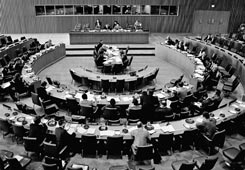 Following the prosecutions for crimes against peace at the end of the second World War, the United Nations General Assembly affirmed “the principles of international law” recognised by the Charter of the Nuremberg Tribunal and the Tribunal judgment (resolution 95 (I) of 11 December 1946) and directed the International Law Commission (ILC) to formulate those principles and to prepare a code of offences against the peace and security of mankind (resolution 177 (II) of 21 November 1947). The ILC completed some draft principles which followed the Nuremberg Charter in their description of aggression and, later, a code of offences which included aggression; but neither of these documents were adopted by the General Assembly (resolution 488 (V) of 12 December 1950 and resolution 897 (IX) of 4 December 1954). Following the prosecutions for crimes against peace at the end of the second World War, the United Nations General Assembly affirmed “the principles of international law” recognised by the Charter of the Nuremberg Tribunal and the Tribunal judgment (resolution 95 (I) of 11 December 1946) and directed the International Law Commission (ILC) to formulate those principles and to prepare a code of offences against the peace and security of mankind (resolution 177 (II) of 21 November 1947). The ILC completed some draft principles which followed the Nuremberg Charter in their description of aggression and, later, a code of offences which included aggression; but neither of these documents were adopted by the General Assembly (resolution 488 (V) of 12 December 1950 and resolution 897 (IX) of 4 December 1954).
State Aggression
Separately, attempts had been made to reach international agreement on the meaning of aggression by States. One attempt was made during the negotiations in San Francisco for the drafting of the Charter of the United Nations, but proposals for this purpose were rejected. In 1950, the Union of Soviet Socialist Republics put forward to the General Assembly a proposal for a definition of aggression similar to a proposal it had made in 1933. In the context of an item entitled “Duties of States in the event of the outbreak of hostilities”, the proposal was referred to the ILC (resolution 378 B (V) of 17 November 1950). It was the year the Korean war began. The Security Council had largely failed in the role given to it in Article 39 of the Charter to “determine the existence of any threat to the peace, breach of the peace, or act of aggression”.
Early Attempts to Draft a Definition
The ILC did not reach agreement on a definition of aggression, the Special Rapporteur indeed being of the view that aggression “by its very essence, is not susceptible of definition” (A/CN.4/44, p. 69). The General Assembly looked at the question again in 1952 and set up a special committee to draft “definitions of aggression or draft statements of the notion of aggression” (resolution 688 (VII) of 20 December 1952). Neither this committee nor two subsequent ones (created by resolution 895 (IX) of 4 December 1954 and resolution 1181 (XII) of 29 November 1957) reached agreement on a definition. It required the establishment of a fourth special committee (resolution 2330 (XXII) of 18 December 1967) and sixteen more years before a definition of aggression was finally adopted.
The protracted nature of the negotiations is explicable partly in terms of Cold War tensions. But there were also concerns that the preparation of a list of aggressive acts would inevitably be incomplete and therefore misleading. During the period when the special committees were looking at the matter, the proliferation of threats and conflicts such as the Suez crisis, the Cuban missile crisis, the conflict in the Congo, the Vietnam war and the occupations of Hungary and Czechoslovakia, gave rise to opposing notions with regard to the desirability of defining aggression. To some, a clear definition was needed more than ever, to others a definition was thought to make it more difficult to achieve peace since it could restrict the flexibility of the United Nations.
Definition of Aggression
On 14 December 1974, the General Assembly adopted by consensus resolution 3314 (XXIX) annexing the Definition of Aggression which had been adopted by the fourth special committee. The Definition begins with a broad definition of aggression, drawn largely from Article 2, paragraph 4, of the Charter (though omitting reference to threats) and then enumerates specific examples of acts of aggression. The acts set out in article 3 qualify as acts of aggression, subject to the provisions of article 2, which envisage that the Security Council may decide not to make a determination of aggression in the light of the circumstances, including the fact that the acts are not of sufficient gravity. Article 4 specifies that the list is not exhaustive and that the Security Council may determine that other acts constitute aggression. The issue of self-determination was a live one during the negotiations and it was dealt with in a saving clause in article 7.
Invasion of a State by the armed forces of another State, with or without occupation of the territory, heads the list of aggressive acts set out in article 3. Of the other acts listed, a few problems that arose in the negotiations may be mentioned. The reference to port blockade in paragraph (c) gave rise to demands from landlocked States that blockade should include denial of access to and from the sea, a problem that was resolved, not to the satisfaction of all, by including a note in the Sixth Committee’s report to the General Assembly that the Definition did not justify a State in blocking access routes to the sea for landlocked countries (A/9890, para. 9). Concerns were expressed that the reference in paragraph (d) to attacks on marine fleets would include as aggression activities by coastal States to preserve fish stocks or the environment. Again the solution was to add a note stating that nothing in the Definition prejudiced the authority of a State to exercise its rights, compatibly with the Charter, within its national jurisdiction (A/9890, para. 10). Paragraph (g), relating to irregular bands or mercenaries going from one State into another, constituted one of the major difficulties in reaching consensus on the Definition. Agreement was finally reached by narrowing earlier proposals to limit the text to “sending” organized groups, rather than organising and supporting them.
Difficult compromises were necessary to reach consensus on the text. Interpretative statements to express particular interpretations of the Definition were made by Government delegations on adoption of the Definition both in the special committee and in the General Assembly.
Use of the Definition
Paragraph 4 of resolution 3314 (XXIX) drew the attention of the Security Council to the Definition and recommended that the Council “should, as appropriate, take account of that Definition as guidance in determining, in accordance with the Charter, the existence of an act of aggression.” The Definition has rarely if ever been used for that purpose. It has however been referred to by the International Court of Justice (ICJ) in its consideration of unlawful use of force by States. The ICJ has decided that the provision in article 3, paragraph (g), of the Definition reflects customary international law (Military and Paramilitary Activities in and against Nicaragua (Nicaragua v. United States of America), Merits, Judgment, I.C.J. Reports 1986, p. 14, para. 3; see also Armed Activities on the Territory of the Congo (Democratic Republic of the Congo v. Uganda), Judgment of 19 December 2005, para. 146). However, the status in customary law of the resolution as a whole is controversial (see the view of Judge Kooijmans in Armed Activities on the Territory of the Congo (Democratic Republic of the Congo v. Uganda), Separate Opinion, para. 63).
The Definition has been given new life by becoming a major source for the negotiations on the definition of the crime of aggression within the jurisdiction of the International Criminal Court. The use of the Definition for the purpose of individual criminal responsibility has been controversial, since the Definition differentiates between State responsibility and individual crimes: article 5, paragraph 2, which reflects paragraph 1 of the Friendly Relations Declaration (General Assembly resolution 2625 (XXV) of 24 October 1970, annex), accords individual responsibility only regarding a “war of aggression”. As the ILC noted in its commentary on its 1994 draft Statute for an international criminal court, resolution 3314 (XXIX) “deals with aggression by States, not with the crimes of individuals, and is designed as a guide for the Security Council, not as a definition for judicial use. But, given the provisions of Article 2, paragraph 4, of the Charter of the United Nations, that resolution offers some guidance”. The resolution now forms part of the Discussion paper proposed by the Chairman in the Special Working Group on the crime of aggression for the International Criminal Court (ICC-ASP/6/SWGCA/2).
This Introductory Note was written in August 2008.
Related Materials
A. Legal Instruments
London Charter of the International Military Tribunal, London, 8 August 1945.
Declaration on Principles of International Law concerning Friendly Relations and Cooperation among States in accordance with the Charter of the United Nations, General Assembly resolution 2625 (XXV) of 24 October 1970.
B. Jurisprudence
International Court of Justice, Military and Paramilitary Activities in and against Nicaragua (Nicaragua v. United States of America), Merits, Judgment, I.C.J. Reports 1986, p. 14.
International Court of Justice, Armed Activities on the Territory of the Congo (Democratic Republic of the Congo v. Uganda), Judgment, I.C.J. Reports 2005, p. 168.
C. Documents
Draft resolution submitted to the First Committee by the Union of Soviet Socialist Republics, Official Records of the General Assembly, Fifth Session, Annexes, agenda item 72 (A/C.1/608, 6 November 1950).
Yearbook of the International Law Commission 1951, vol. II, pp. 43-69 (A/CN.4/44, Second Report on a Draft Code of Offences Against the Peace and Security of Mankind by Mr. J. Spiropoulos, Special Rapporteur).
Report of the Special Committee on the Question of Defining Aggression, 11 March to 12 April 1974, Official Records of the General Assembly, Twenty-Ninth Session, Supplement No. 19 (A/9619 and Corr. l).
Report of the Sixth Committee to the General Assembly (A/9890, 6 December 1974).
Report of the International Law Commission on the work of its forty-sixth session, 2 May to 22 July 1994, Official Records of the General Assembly, Forty-ninth session, Supplement No. 10 (A/49/10, reproduced in Yearbook of the International Law Commission 1994, Vol. II, Part II), p. 38, para. (6) (draft Statute for an international criminal court).
Special Working Group on the Crime of Aggression, Discussion paper on the crime of aggression proposed by the Chairman (ICC-ASP/6/SWGCA/2).
D. Doctrine
B. Broms, “The Definition of Aggression”, Recueil des Cours, vol. 154 (I), 1977, p. 348.
B. Ferencz, Defining International Aggression: The Search for World Peace, vol. II, Oceana publications, Dobbs Ferry, New York, 1975.
A. Rifaat, International Aggression, Almqvist and Wiksell International, Stockholm, 1979.
J. Stone, “Hopes and Loopholes in the 1974 Definition of Aggression” American Journal of International Law, vol. 71, 1977, p 224.
Already under the League of Nations attempts were made to define aggression. The Special Committee of the Temporary Mixed Commission for the Reduction of Armaments, for instance, had considered it desirable to define exactly what constituted an act of aggression in order to provide the basis for the Council to decide in a given case whether an act of aggression had been committed. The Commission was, however, unable to draw up any such definition of aggression and therefore merely indicated the factors that might provide the elements of a just decision made by the Council (Commentary on the Definition of a case of Aggression by a Special Committee of the Temporary Mixed Commission, Records of the Fourth Assembly, Minutes of the Third Committee, League of Nations O.J. Spec. Supp. 26, pp. 183-185).
At the United Nations Conference on International Organization, held in San Francisco from 25 April to 26 June 1945, several delegations proposed that the term “aggression”, contained in section B of Chapter VIII of the Dumbarton Oaks Proposals (which later became Chapter VII of the Charter), be defined or explained, but the majority of Committee III/3, working with these issues, thought that a preliminary definition of the term went beyond the scope of the Charter and that the modern techniques of warfare rendered very difficult the definition of all cases of aggression (see Report of Mr. Paul-Boncour, Rapporteur, on Chapter VIII, Section B, Doc. 881 (English) III/3/46, 10 June 1945, United Nations Conference on International Organization, Vol. 12,p. 505).
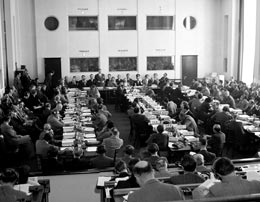 During its fifth session, the General Assembly, in resolution 378 (V) of 17 November 1950, decided to refer to the International Law Commission a proposal made by the Union of Soviet Socialist Republics in connection with the agenda item “Duties of States in the event of the outbreak of hostilities” and all the records of the First (Political and Security) Committee of the General Assembly dealing with the question, so that the Commission might take them into consideration and formulate its conclusions as soon as possible. The Soviet proposal provided that the General Assembly, “considering it necessary ... to define the concept of aggression as accurately as possible,” declares, inter alia, that “in an international conflict that State shall be declared the attacker which first commits” one of the acts enumerated in the proposal (A/C.1/608). During its fifth session, the General Assembly, in resolution 378 (V) of 17 November 1950, decided to refer to the International Law Commission a proposal made by the Union of Soviet Socialist Republics in connection with the agenda item “Duties of States in the event of the outbreak of hostilities” and all the records of the First (Political and Security) Committee of the General Assembly dealing with the question, so that the Commission might take them into consideration and formulate its conclusions as soon as possible. The Soviet proposal provided that the General Assembly, “considering it necessary ... to define the concept of aggression as accurately as possible,” declares, inter alia, that “in an international conflict that State shall be declared the attacker which first commits” one of the acts enumerated in the proposal (A/C.1/608).
In 1951, the International Law Commission considered the question whether it should enumerate aggressive acts or try to draft a definition of aggression in general terms. It was decided that the only practical course was to aim at a general and abstract definition of aggression, but the Commission’s efforts to draw up a general definition were not successful. During the same session, the matter was reconsidered in connection with the preparation of the draft Code of Offences against the Peace and Security of Mankind. The Commission then decided to include among the offences defined in the draft Code any act of aggression and any threat of aggression (A/1858).
The report of the International Law Commission was on the agenda of the sixth session of the General Assembly, in 1952, and was submitted for consideration to the Sixth Committee, where it was discussed from 5 to 22 January 1952. The Committee adopted a draft resolution, which was submitted to the General Assembly (A/2087). On the recommendation of the Sixth Committee the General Assembly adopted resolution 599 (VI) on 31 January 1952. The General Assembly thereby concluded that it was both “possible and desirable, with a view to ensuring international peace and security and to developing international criminal law, to define aggression by reference to the elements which constitute it”. Furthermore, it decided to include the question of defining aggression in the agenda of its seventh session and instructed the Secretary-General to submit to it at that session a report in which the question of defining aggression should be thoroughly discussed.
The question of defining aggression was accordingly on the agenda of the General Assembly at its seventh session, in 1952, and was again allocated to the Sixth Committee for consideration. The Committee, which discussed the matter from 19 November to 10 December 1952, had before it the report on the question submitted by the Secretary-General (A/2211). Various representatives supported the idea of creating a special committee to study the question further and to present one or more draft definitions to the General Assembly. The Sixth Committee presented to the General Assembly a draft resolution providing accordingly (A/2322 and Corr.1), which the Assembly considered on 20 December 1952. By resolution 688 (VII) of that date, the General Assembly established a fifteen-member special committee which was requested to submit to the Assembly at its ninth session, in 1954, “draft definitions of aggression or draft statements of the notion of aggression”.
The Special Committee met at United Nations Headquarters from 24 August to 21 September 1953. Several different texts aimed at defining aggression were presented. The committee, however, decided unanimously not to put the texts to a vote but to transmit them in its report (A/2638) to the General Assembly and to Member States for comments. Comments were received from eleven Member States.
The report of the Special Committee was on the agenda of the General Assembly at its ninth session, in 1954, and was submitted for consideration to the Sixth Committee, which discussed it from 14 October to 10 November 1954. Widely different views were expressed on whether it was possible and desirable to define aggression, on what type of definition should be adopted and on the draft definitions which had been submitted. No draft resolutions relating to the substance of the question were, however, put to a vote and the Sixth Committee instead decided, on 10 November 1954, by the adoption of a joint draft resolution submitted by Lebanon, Syria and Yemen (A/C.6/L.337 and Rev.1 and Add.1.), to propose that the General Assembly again establish a special committee to submit to it at its eleventh session, in 1956, a detailed report followed by a draft definition of aggression, having regard to the ideas expressed at the ninth session and to the proposals submitted by delegations. On the recommendation of the Sixth Committee, the General Assembly adopted resolution 895 (IX) of 4 December 1954, by which it established the Special Committee.
The Special Committee, composed of nineteen members, met at United Nations Headquarters from 8 October to 9 November 1956. The members of the Special Committee differed on the possibility and desirability of defining aggression, on the function and scope of such a definition and on the draft definitions submitted to it. The Special Committee therefore did not adopt a definition but decided to transmit its report (A/3574) to the General Assembly, summarizing the views expressed on the various aspects of the matter, together with the draft definitions previously submitted to it. Though the question of defining aggression was included in the provisional agenda of the eleventh session of the General Assembly, the Assembly decided that this item should be postponed until the twelfth session to allow Governments sufficient time to study the report of the Special Committee.
During the General Assembly’s twelfth session, in 1957, the Sixth Committee again discussed the question of defining aggression, having before it the report of the 1956 Special Committee. Several draft resolutions were submitted to the Sixth Committee by Member States, but the Committee finally adopted a merely procedural draft resolution presented by Chile, Colombia, Cuba, Ecuador, El Salvador, the Philippines and Venezuela (A/C.3/L.403/Rev.l). On 29 November 1957, the General Assembly thus adopted resolution 1181 (XII), by which it took note of the Special Committee’s report, and decided to invite the views of twenty-two States admitted to the United Nations since 14 December 1955 and to renew the request for comments from other Member States. It also decided to refer the replies of Governments to a new committee, composed of the Member States which had served on the General Committee of the Assembly at its most recent regular session, and entrusted the committee with the procedural task of studying the replies “for the purpose of determining when it shall be appropriate for the General Assembly to consider again the question of defining aggression”. Lastly, it requested “the Secretary-General to convene the first meeting of the committee prior to the fourteenth session of the General Assembly”.
The said Committee accordingly met at United Nations Headquarters from 14 to 24 April 1959. It was decided (A/AC.91/2) that the fourteen replies received did not indicate any change of attitude and agreed to postpone further consideration of the question until April 1962, unless an absolute majority of its members favoured an earlier meeting in the light of new developments. The Committee asked the Secretary-General to transmit its resolution on the matter to all Member States and to convene the committee in either of the two cases specified.
As no such request to meet earlier than 1962 was received, the second session of the Committee began on 2 April 1962 at United Nations Headquarters in New York. At the end of that session on 9 April, the Committee, on the proposal of Cyprus, adopted a resolution (A/AC.91/3) providing for a further three-year adjournment of its work, until April 1965, unless a request for earlier consideration was received from an absolute majority of the committee's members. By the same resolution, the Committee also asked the Secretary-General to request States admitted to the United Nations since its 1959 session to submit their views on the question of defining aggression. It also asked him to renew his earlier request for other Member States to submit their views on the matter.
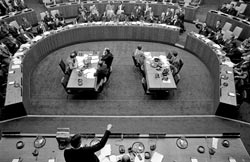 The third session of the Committee took place at the United Nations Headquarters between 5 and 16 April 1965, as no requests for an earlier meeting were received. At the conclusion of its work at that session, the Committee adopted, on the proposal of Cyprus, a resolution (A/AC.91/5) whereby it decided on a further adjournment until April 1967, again, unless a majority requested otherwise. By that resolution adopted on 16 April 1965, the Committee again asked the Secretary-General to request States admitted to the United Nations since its 1962 session to submit their views on the question of defining aggression. The third session of the Committee took place at the United Nations Headquarters between 5 and 16 April 1965, as no requests for an earlier meeting were received. At the conclusion of its work at that session, the Committee adopted, on the proposal of Cyprus, a resolution (A/AC.91/5) whereby it decided on a further adjournment until April 1967, again, unless a majority requested otherwise. By that resolution adopted on 16 April 1965, the Committee again asked the Secretary-General to request States admitted to the United Nations since its 1962 session to submit their views on the question of defining aggression.
At the fourth session of the Committee, held from 3 April to 26 May 1967, three draft resolutions were introduced, but the Committee took no decision on any of these proposals. On 22 September 1967, at the General Assembly’s twenty-second session, the Union of Soviet Socialist Republics requested that an item entitled “Need to expedite the drafting of a definition of aggression in the light of the present international situation” be placed on the Assembly’s agenda as an important and urgent matter (A/6833 and Corr.1). In deciding to place this item on its agenda, the General Assembly also decided that it should hold discussions first in plenary meetings of the General Assembly and then, in the light of the debate and results achieved, in the Sixth Committee. The plenary debate took place between 28 November and 4 December 1967. The item was then taken up in the Sixth Committee on 7 December 1967 and resulted in the adoption, on 14 December of the same, of a draft resolution, submitted by 26 Members (A/C.6/L.644). On the recommendation of the Sixth Committee, the General Assembly thus adopted resolution 2330 (XXII) on 18 December 1967, establishing a 35-member Special Committee on the Question of Defining Aggression which was to “consider all aspects of the question so that an adequate definition of aggression might be prepared” and “submit to the General Assembly at its twenty-third session a report which would reflect all the views expressed and the proposals made.” It was furthermore decided “to include in the provisional agenda of [the General Assembly’s] twenty-third session an item entitled ‘Report of the Special Committee on the Question of Defining Aggression’”.
The Special Committee accordingly met, prior to the twenty-third session of the General Assembly, from 4 June to 6 July 1968, and adopted a draft resolution (A/7185/Rev.1) which would have had the Assembly decide, among other things, that the Special Committee should resume its work as soon as possible before the end of 1968, so that it could complete its work by submitting a report containing a generally accepted draft definition of aggression to the General Assembly at its twenty-third session. The report of the Special Committee was discussed at the General Assembly’s twenty-third session, later in 1968, mainly in the Sixth Committee. The Sixth Committee decided not to recommend that the General Assembly schedule meetings of the Special Committee during 1968 and instead adopted a draft resolution (A/C.6/L.733/Rev.1 and Add. 1-3) which would have the Special Committee resume its work as early as possible in 1969. On 18 December 1968, the General Assembly, acting on the basis of the recommendation of the Sixth Committee, adopted resolution 2420 (XXIII) on the question of defining aggression.
The Special Committee held six further sessions, one every year from 1968 to 1974, its mandate having been annually renewed by the General Assembly (see resolutions 2420 (XXIII) of 18 December 1968, 2549 (XXIV) of 12 December 1969, 2644 (XXV) of 25 November 1970, 2781 (XXVI) of 3 December 1971, 2967 (XXVII) of 14 December 1972 and 3105 (XXVIII) of 12 December 1973).
At its seventh and last session held at United Nations Headquarters in New York from 11 March to 12 April 1974, the Special Committee decided to establish a working group. The working group established three Contact Groups, to which it referred for consideration different areas relating to the definition of aggression. After the working group had received the reports of Contact Groups I, II and III, it established Contact Group IV, which was instructed to prepare a new consolidated text of the draft definition of aggression in the light of those reports. On 11 April 1974, the working group decided to refer the revised consolidated text prepared by Contact Group IV for final review to a drafting group. On the same day, the working group considered the text of the draft definition of aggression as finally reviewed by the drafting group. It took note of the report of the chairman of the drafting group and decided by consensus to submit to the Special Committee, for its approval, the text of the draft definition (A/9619 and Corr.1). It also recommended that the Special Committee include in its report further explanatory notes on the interpretation of certain words and phrases in articles 3 and 5 of the text. On 12 April 1974, the Special Committee adopted by consensus the text of the draft definition of aggression, as well as the explanatory notes, and recommended to the General Assembly the adoption of the draft.
The report of the Special Committee on the Question of Defining Aggression, which contained the draft definition, was taken up by the General Assembly at its twenty-ninth session, in 1974, and was referred to the Sixth Committee for consideration. The Sixth Committee considered the report and the text of the definition between 8 October and 22 November 1974. It made no amendments to the text of the definition elaborated by the Special Committee, but decided to include in its report to the General Assembly two statements clarifying the Sixth Committee’s views on operative paragraphs 3(c) and 3(d) concerning the qualification of “[t]he blockade of the ports or coasts of a State by the armed forces of another State” and “[a]n attack by the armed forces of a State on the land, sea or air forces, or marine and air fleets of another State” as acts of aggression. On the recommendation of the Sixth Committee, the General Assembly, on 14 December 1974, adopted without a vote resolution 3314 (XXIX), to which the Definition of Aggression was annexed. The General Assembly also called the attention of the Security Council to the Definition and recommended that the Security Council should, as appropriate, take account of that Definition as guidance in determining, in accordance with the Charter, the existence of an act of aggression.
Text of the Resolution
Selected preparatory documents
(in chronological order)
Report of Mr. Paul-Boncour, Rapporteur, on Chapter VIII, Section B (Doc. 881, III/3/46, 10 June 1945, United Nations Conference on International Organization, Vol. 12, p. 505)
First Committee of the General Assembly, draft resolution submitted by the Union of Soviet Socialist Republics (A/C.1/608, 6 November 1950)
General Assembly resolution 378 (V) of 17 November 1950 (Duties of States in the event of the outbreak of hostilities)
Report of the International Law Commission on its Third Session, 16 May to 27 July, Official Records of the General Assembly, Sixth Session, Supplement No. 9 (A/1858, reproduced in Yearbook of the International Law Commission 1951, vol. II, pp. 123-144)
Report of the Sixth Committee to the General Assembly (A/2087, 29 January 1952)
General Assembly resolution 599 (VI) of 31 January 1952 (Question of defining aggression)
Report of the Secretary-General, “Question of Defining Aggression” (A/2211, 3 October 1952)
Report of the Sixth Committee to the General Assembly (A/2322 and Corr.1, 19 December 1952)
General Assembly resolution 688 (VII) of 20 December 1952 (Question of defining aggression)
Report of the Special Committee on the Question of Defining Aggression established under General Assembly resolution 688 (VII) of 20 December 1952 (Question of defining aggression), 24 August to 21 September 1953, Official Records of the General Assembly, Ninth Session, Supplement No. 11 (A/2638)
Sixth Committee of the General Assembly, draft resolution (A/C.6/L.337 and Rev.1 and Add.1, 10 November 1954)
Report of the Sixth Committee to the General Assembly (A/2806, 26 November 1954)
General Assembly resolution 895 (IX) of 4 December 1954 (Question of defining aggression)
Report of the Special Committee on the Question of Defining Aggression established under General Assembly resolution 895 (IX) of 4 December 1954 (Question of defining aggression), 8 October to 9 November 1956, Official Records of the General Assembly, Twelfth Session, Supplement No. 16 (A/3574)
Sixth Committee of the General Assembly, draft resolution (A/C.6/L.403/Rev.l, 19 November 1957)
Report of the Sixth Committee to the General Assembly (A/3756, 27 November 1957)
General Assembly resolution 1181 (XII) of 29 November 1957 (Question of defining aggression)
Report of the Committee established pursuant to General Assembly resolution 1181 (XII) (Question of Defining Aggression), first session (A/AC.91/2, 24 April 1959)
Report of the Committee established under General Assembly resolution 1181 (XII) (Question of Defining Aggression), second session (A/AC.91/3, 13 April 1962)
Report of the Committee established under General Assembly resolution 1181 (XII) (Question of Defining Aggression), third session (A/AC.91/5, 26 April 1965)
Letter of 22 September 1967 from the Union of Soviet Socialist Republics requesting inclusion in agenda of an item entitled: “Need to expedite the drafting of a definition of aggression in the light of the present international situation” (A/6833, 22 September 1967 and Corr.1, 25 September 1967)
Sixth Committee of the General Assembly, draft resolution (A/C.6/L.644, 14 December 1967)
Report of the Sixth Committee to the General Assembly (A/6988, 15 December 1967)
General Assembly resolution 2330 (XXII) of 18 December 1967 (Need to expedite the drafting of a definition of aggression in the light of the present international situation)
Report of the Special Committee on the Question of Defining Aggression established under General Assembly resolution 2330 (XXII) of 18 December 1967, first session, 4 June to 6 July 1968, Official Records of the General Assembly, Twenty-Third Session, Supplement No. 19 (A/7185/Rev.1)
Report of the Sixth Committee to the General Assembly (A/7402, 13 December 1968)
General Assembly resolution 2420 (XXIII) of 18 December 1968 (Report of the Special Committee on the Question of Defining Aggression)
General Assembly resolution 2549 (XXIV) of 12 December 1969 (Report of the Special Committee on the Question of Defining Aggression)
General Assembly resolution 2644 (XXV) of 25 November 1970 (Report of the Special Committee on the Question of Defining Aggression)
General Assembly resolution 2781 (XXVI) of 3 December 1971 (Report of the Special Committee on the Question of Defining Aggression)
General Assembly resolution 2967 (XXVII) of 14 December 1972 (Report of the Special Committee on the Question of Defining Aggression)
General Assembly resolution 3105 (XXVIII) of 12 December 1973 (Report of the Special Committee on the Question of Defining Aggression)
Report of the Special Committee on the Question of Defining Aggression established under General Assembly resolution 2330 (XXII) of 18 December 1967, seventh session, 11 March to 12 April 1974, Official Records of the General Assembly, Twenty-Ninth Session, Supplement No. 19 (A/9619 and Corr.1)
General Assembly resolution 3314 (XXIX) of 14 December 1974 (Definition of aggression)
 |
Twenty-ninth Session of the General Assembly, Sixth Committee, 1471st meeting, 8 October 1974: Report of the Special Committee on the Question of Defining Aggression (A/9619 and Corr. 1)
Audio (30 minutes, Full version) |
 |
Statement by Mr. Milan Sahovic (Yugoslavia), Chairman of the Sixth Committee
Introduction of the agenda item
Audio (1 minute, Français) |
 |
Statement by Mr. Sanders (Guyana), Rapporteur of the Special Committee on the question of Defining Aggression at its seventh session
Introduction of the report of the Special Committee
Audio (7 minutes, English) |
 |
Statement by Mr. Broms (Finland), Chairman of the Special Committee on the Question of Defining Aggression at its seventh session
Audio (12 minutes, English) |
 |
Statement by Mr. Milan Sahovic (Yugoslavia), Chairman of the Sixth Committee
Audio (6 minutes, Français) |
 |
Statement by Mr. Rossides (Cyprus)
Audio (3 minutes, English) |
 |
Twenty-ninth Session of the General Assembly, Sixth Committee, 1472nd meeting, 9 October 1974: Report of the Special Committee on the Question of Defining Aggression (A/9619 and Corr. 1)
Audio (2 hours, 13 minutes, Full version) |
 |
Statement by Mr. Kolesnik (Union of Soviet Socialist Republics)
Audio (30 minutes, Русский) |
 |
Statement by Mr. Rydbeck (Sweden)
Audio (16 minutes, English) |
 |
Statement by Mr. Klafkowski (Poland)
Audio (14 minutes, Français) |
 |
Statement by Mr. Migliuolo (Italy)
Audio (10 minutes, English) |
 |
Statement by Mr. Verosta (Austria)
Audio (21 minutes, English) |
 |
Statement by Mr. Elias (Spain)
Audio (17 minutes, Español) |
 |
Statement by Mr. Bojilov (Bulgaria)
Audio (13 minutes, English) |
 |
Statement by Mr. Sa’di (Jordan)
Audio (3 minutes, English/العربية) |
 |
Twenty-ninth Session of the General Assembly, Sixth Committee, 1474th meeting, 11 October 1974: Report of the Special Committee on the Question of Defining Aggression (A/9619 and Corr. 1)
Audio (2 hours, 8 minutes, Full version) |
 |
Statement by Mr. Jemiyo (Nigeria)
Audio (6 minutes, English) |
 |
Statement by Mr. Perez de Cuellar (Peru)
Audio (21 minutes, Español) |
 |
Statement by Mr. Nyamdo (Mongolia)
Audio (14 minutes, Русский) |
 |
Statement by Mr. Orrego (Chile)
Audio (12 minutes, Español) |
 |
Statement by Mr. Njenga (Kenya)
Audio (20 minutes, English) |
 |
Statement by Mr. Bessou (France)
Audio (12 minutes, Français) |
 |
Statement by Mr. Rakotoson (Madagascar)
Audio (15 minutes, Français) |
 |
Statement by Mr. Sette Camara (Brazil)
Audio (18 minutes, English) |
 |
Statement by Mr. Zuleta (Colombia)
Audio (9 minutes, Español) |
 |
Twenty-ninth Session of the General Assembly, Sixth Committee, 1475th meeting, 14 October 1974: Report of the Special Committee on the Question of Defining Aggression (A/9619 and Corr. 1)
Audio (1 hour, 14 minutes, Full version) |
 |
Statement by Mr. Ceausu (Romania)
Audio (29 minutes, Français) |
 |
Statement by Mr. An Chih-yuan (China)
Audio (12 minutes, 中文) |
 |
Statement by Mr. Siage (Syrian Arab Republic)
Audio (11 minutes, العربية) |
 |
Statement by Mr. Quentin-Baxter (New Zealand)
Audio (19 minutes, English) |
 |
Twenty-ninth Session of the General Assembly, Sixth Committee, 1476th meeting, 15 October 1974: Report of the Special Committee on the Question of Defining Aggression (A/9619 and Corr. 1)
Audio (1 hour, 21 minutes, Full version) |
 |
Statement by Mr. Aleman (Ecuador)
Audio (16 minutes, Español) |
 |
Statement by Mr. Van Brusselen (Belgium)
Audio (20 minutes, Français) |
 |
Statement by Mr. Görner (German Democratic Republic)
Audio (11 minutes, English) |
 |
Statement by Mr. Baroody (Saudi Arabia)
Audio (28 minutes, English) |
 |
Twenty-ninth Session of the General Assembly, Sixth Committee, 1477th meeting, 15 October 1974: Report of the Special Committee on the Question of Defining Aggression (A/9619 and Corr. 1)
Audio (1 hour, 36 minutes, Full version) |
 |
Statement by Mr. Mahmud (Pakistan)
Audio (6 minutes, English) |
 |
Statement by Mr. Reshetnyak (Ukrainian Soviet Socialist Republic)
Audio (16 minutes, Русский) |
 |
Statement by Mr. Omar (Libyan Arab Republic)
Audio (9 minutes, العربية) |
 |
Statement by Mr. Steel (United Kingdom)
Audio (30 minutes, English) |
 |
Statement by Mr. Güney (Turkey)
Audio (13 minutes, Français) |
 |
Statement by Mr. Petrella (Argentina)
Audio (8 minutes, Español) |
 |
Statement by Mr. Fuentes Ibañez (Bolivia)
Audio (11 minutes, Español) |
 |
Twenty-ninth Session of the General Assembly, Sixth Committee, 1478th meeting, 16 October 1974: Report of the Special Committee on the Question of Defining Aggression (A/9619 and Corr. 1)
Audio (2 hours, 6 minutes, Full version) |
 |
Statement by Mr. Khan (Bangladesh)
Audio (7 minutes, English) |
 |
Statement by Mr. Yasseen (Iraq)
Audio (36 minutes, Français) |
 |
Statement by Mr. Bracklo (Federal Republic of Germany)
Audio (12 minutes, English) |
 |
Statement by Mr. Alves Martins (Portugal)
Audio (5 minutes, English) |
 |
Statement by Mr. Coles (Australia)
Audio (20 minutes, English) |
 |
Statement by Mr. Ikouébé (Congo)
Audio (7 minutes, Français) |
 |
Statement by Mr. Ustor (Hungary)
Audio (13 minutes, English) |
 |
Statement by Mr. Jaipal (India)
Audio (13 minutes, English) |
 |
Statement by Mr. Kurukulasuriya (Sri Lanka)
Audio (11 minutes, English) |
 |
Twenty-ninth Session of the General Assembly, Sixth Committee, 1479th meeting, 18 October 1974: Report of the Special Committee on the Question of Defining Aggression (A/9619 and Corr. 1)
Audio (2 hours, 2 minutes, Full version) |
 |
Statement by Mr. Petrić (Yugoslavia)
Audio (24 minutes, English) |
 |
Statement by Mr. Rossides (Cyprus)
Audio (18 minutes, English) |
 |
Statement by Mr. Villagran Kramer (Guatemala)
Audio (19 minutes, Español) |
 |
Statement by Mr. Obadi (Democratic Yemen)
Audio (12 minutes, العربية) |
 |
Statement by Mr. Boulbina (Algeria)
Audio (19 minutes, Français) |
 |
Statement by Mr. Alvarez Tabio (Cuba)
Audio (21 minutes, Español) |
 |
Statement by Mr. Ghaussy (Afghanistan)
Audio (12 minutes, Français) |
 |
Statement by the Representative of Turkey
Audio (23 seconds, Français) |
 |
Twenty-ninth Session of the General Assembly, Sixth Committee, 1480th meeting, 18 October 1974: Report of the Special Committee on the Question of Defining Aggression (A/9619 and Corr. 1)
Audio (3 hours, 38 minutes, Full version) |
 |
Statement by Mr. Robinson (Jamaica)
Audio (23 minutes, English) |
 |
Statement by Mr. Mai’ga (Mali)
Audio (11 minutes, Français) |
 |
Statement by Mr. Dabiri (Iran)
Audio (13 minutes, Français) |
 |
Statement by Mr. M’Bodj (Senegal)
Audio (6 minutes, Français) |
 |
Statement by Mrs. Mpagi (Uganda)
Audio (4 minutes, English) |
 |
Statement by Mr. Kumi (Ghana)
Audio (9 minutes, English) |
 |
Statement by Mr. Adjoyi (Togo)
Audio (8 minutes, Français) |
 |
Statement by Mr. Bamba (Upper Volta)
Audio (6 minutes, Français) |
 |
Statement by Mr. Bararwerekana (Rwanda)
Audio (7 minutes, Français) |
 |
Statement by Mrs. Slámová (Czekoslovakia)
Audio (10 minutes, Русский) |
 |
Statement by Mr. Montenegro (Nicaragua)
Audio (11 minutes, Español) |
 |
Statement by Mr. Rasolko (Byelorussian Soviet Socialist Republic)
Audio (10 minutes, Русский) |
 |
Statement by Mr. Rosenne (Israel)
Audio (23 minutes, English) |
 |
Statement by Mr. Tellefsen (Norway)
Audio (3 minutes, English) |
 |
Statement by Mr. Rosenstock (United States of America)
Audio (13 minutes, English) |
 |
Statement by Mr. Güney (Turkey), speaking in exercise of his right of reply
Audio (9 minutes, Français) |
 |
Statement by Mr. Yasseen (Iraq), speaking in exercise of his right of reply
Audio (6 minutes, Français) |
 |
Statement by Mr. Rosenne (Israel)
Audio (2 minutes, English) |
 |
Statement by Mr. Rossides (Cyprus), speaking in exercise of his right of reply
Audio (19 minutes, English) |
 |
Statement by Mr. Yasseen (Iraq), speaking in exercise of his right of reply
Audio (2 minutes, Français) |
 |
Statement by Mr. Rosenne (Israel), speaking in exercise of his right of reply
Audio (56 seconds, English) |
 |
Statement by Mr. Rossides (Cyprus)
Audio (58 seconds, English) |
 |
Statement by Mr. Güney (Turkey)
Audio (4 minutes, Français) |
 |
Statement by Mr. Eustathiades (Greece)
Audio (27 seconds, Français) |
 |
Statement by Mr. Rossides (Cyprus)
Audio (1 minute, English) |
 |
Statement by Mr. Güney (Turkey)
Audio (28 seconds, Français) |
 |
Statement by Mr. Yasseen (Iraq)
Audio (1 minutes, Français) |
 |
Twenty-ninth Session of the General Assembly, Sixth Committee, 1482nd meeting, 22 October 1974: Report of the Special Committee on the Question of Defining Aggression (A/9619 and Corr. 1)
Audio (3 hours, 16 minutes, Full version) |
 |
Statement by Mr. Rios (Panama)
Audio (8 minutes, Español) |
 |
Statement by Mr. Niyungeko (Burundi)
Audio (8 minutes, Français) |
 |
Statement by Mr. Fernandez Ballesteros (Uruguay)
Audio (14 minutes, Español) |
 |
Statement by Mr. Guerrero (Philippines)
Audio (9 minutes, English) |
 |
Statement by Mr. Gana (Tunisia)
Audio (10 minutes, Français) |
 |
Statement by Mr. Varela (Costa Rica)
Audio (7 minutes, Español) |
 |
Statement by Mr. Wisnoemoerti (Indonesia)
Audio (9 minutes, English) |
 |
Statement by Mr. Al-Haddad (Yemen)
Audio (4 minutes, English) |
 |
Statement by Mr. Soglo (Dahomey)
Audio (9 minutes, Français) |
 |
Statement by Mr. Eustathiades (Greece)
Audio (47 minutes, Français) |
 |
Statement by Mr. Chaila (Zambia)
Audio (6 minutes, English) |
 |
Statement by Mr. Rossides (Cyprus) speaking in exercise of his right of reply
Audio (10 minutes, English) |
 |
Statement by Mr. Güney (Turkey) speaking in exercise of his right of reply
Audio (19 minutes, Français) |
 |
Statement by Mr. Rossides (Cyprus) speaking in exercise of his right of reply
Audio (9 minutes, English) |
 |
Statement by Mr. Güney (Turkey) speaking in exercise of his right of reply
Audio (5 minutes, Français) |
 |
Statement by Mr. Eustathiades (Greece)
Audio (5 minutes, Français) |
 |
Statement by Mr. Güney (Turkey)
Audio (1 minutes, Français) |
 |
Statement by Mr. Rossides (Cyprus)
Audio (5 minutes, English) |
 |
Statement by Mr. Güney (Turkey)
Audio (1 minutes, Français) |
 |
Statement by Mr. Eustathiades (Greece)
Audio (2 minutes, Français) |
 |
Statement by Mr. Güney (Turkey)
Audio (26 seconds, Français) |
 |
Twenty-ninth Session of the General Assembly, Sixth Committee, 1503rd meeting, 21 November 1974: Report of the Special Committee on the Question of Defining Aggression (A/9619 and Corr. 1)
Audio (1 hour,
11 minutes,
Full version) |
 |
Statement by Mr. Prietro (Chile)
Audio (9 minutes, Español) |
 |
Statement by Mr. Milan Sahovic (Yugoslavia), Chairman of the Sixth Committee
Adoption of draft resolution A/C.6/L.993 without a vote
Audio (4 minutes, Français/English) |
 |
Statement by Ms. Ho Li-liang (China)
Audio (8 minutes, 中文) |
 |
Statement by Mr. Soglo (Dahomey)
Audio (5 minutes, Français) |
 |
Statement by Mr. Zaldivar-Brizuela (El Salvador)
Audio (2 minutes, Español) |
 |
Statement by Mr. Rosenne (Israel)
Audio (37 seconds, English) |
 |
Statement by Mr. Godoy (Paraguay)
Audio (5 minutes, Español) |
 |
Statement by Mr. De Soto (Peru)
Audio (6 minutes, Español) |
 |
Statement by Mr. Nyamdo (Mongolia)
Audio (1 minute,
Русский) |
 |
Statement by Mr. Prieto (Chile)
Audio (2 minutes, Español) |
 |
Statement by Mr. Milan Sahovic (Yugoslavia), Chairman of the Sixth Committee
Audio (58 seconds, Français) |
 |
Statement by Mr. Prieto (Chile)
Audio (4 minutes, Español) |
 |
Statement by Mr. Rybakov, Secretary of the Committee
Audio (2 minutes, English) |
 |
Statement by Mr. Rosenstock (United States of America)
Audio (1 minute, English) |
 |
Statement by Mr. Kolesnik (Union of Soviet Socialist Republics)
Audio (1 minute,
Русский) |
 |
Statement by Mr. Rosenne (Israel)
Audio (30 seconds, English) |
 |
Statement by Mr. Prieto (Chile)
Audio (2 minutes, Español) |
 |
Statement by Mr. Hyera (United Republic of Tanzania)
Audio (12 minutes, English) |
 |
Twenty-ninth Session of the General Assembly, Sixth Committee, 1504th meeting, 22 November 1974: Report of the Special Committee on the Question of Defining Aggression (A/9619 and Corr. 1, A/C.6/L.990, L.993)
Audio (1 hour, 52 minutes, Full version) |
 |
Statement by Mr. Garcia Ortiz (Ecuador)
Audio (2 minutes, Español) |
 |
Statement by Mr. Rao (India)
Audio (4 minutes, English) |
 |
Statement by Mr. Wisnoemoerti (Indonesia)
Audio (1 minute, English) |
 |
Statement by Mr. Arita Quiñonez (Honduras)
Audio (59 seconds,
Español) |
 |
Statement by Mr. Mahmud (Pakistan)
Audio (4 minutes,
English) |
 |
Statement by Mr. Kolesnik (Union of Soviet Socialist Republics)
Audio (16 minutes,
Русский) |
 |
Statement by Mr. Lekaukau (Botswana)
Audio (1 minute, English) |
 |
Statement by Mr. Maniang (Sudan)
Audio (2 minutes, English) |
 |
Statement by Mr. Fuentes Ibañez (Bolivia)
Audio (3 minutes,
Español) |
 |
Statement by Mr. Miller (Canada)
Audio (8 minutes, English) |
 |
Statement by Mr. Essy (Ivory Coast)
Audio (4 minutes,
Français) |
 |
Statement by Mr. Bamba (Upper Volta)
Audio (2 minutes, Français) |
 |
Statement by Ms. Ulyanova (Ukranian Soviet Socialist Republic)
Audio (6 minutes,
Русский) |
 |
Statement by Mr. Shafaghat (Iran)
Audio (29 seconds, Français) |
 |
Statement by Mr. Hassouna (Egypt)
Audio (2 minutes, English) |
 |
Statement by Mrs. Grossman (Dominican Republic)
Audio (3 minutes,
Español) |
 |
Statement by Mr. Tien Chin (China), speaking in exercise of his right of reply
Audio (1 minute, 中文) |
 |
Statement by Mr. Prieto (Chile)
Audio (3 minutes, Español) |
 |
Statement by Mr. Milan Šahović (Yugoslavia), Chairman of the Sixth Committee
Audio (2 minutes, Français) |
 |
Statement by Mr. Rosenstock (United States of America)
Audio (2 minutes, English) |
 |
Statement by Mr. Prieto (Chile)
Audio (48 seconds, Español) |
 |
Statement by Mr. Kolesnik (Union of Soviet Socialist Republics)
Audio (3 minutes, Русский) |
 |
Statement by Mr. Starčević (Yugoslavia)
Audio (3 minutes, English) |
 |
Statement by Mr. Prieto (Chile)
Audio (2 minutes, Español) |
 |
Statement by Mr. Steel (United Kingdom)
Audio (3 minutes, English) |
 |
Statement by Mr. Hassouna (Egypt)
Audio (2 minutes, English) |
 |
Statement by Mr. Jeannel (France)
Audio (4 minutes, Français) |
 |
Statement by Mr. Frenandez Ballesteros (Uruguay)
Audio (2 minutes, Español) |
 |
Statement by Mr. Chaves (Grenada)
Audio (45 seconds, English) |
 |
Statement by Mr. Sciolla-La Grange (Italy)
Audio (2 minutes, Français) |
 |
Statement by Mr. Kolesnik (Union of Soviet Socialist Republics)
Audio (3 minutes, Русский) |
 |
Statement by Mr. Brennan (Australia)
Audio (3 minutes, English) |
 |
Statement by Mr. Mai’ga (Mali)
Audio (59 seconds, Français) |
 |
Statement by Mr. Milan Šahović (Yugoslavia), Chairman of the Sixth Committee
Audio (1 minute, Français) |
 |
Statement by Mr. Brennan (Australia)
Audio (1 minute, English) |
 |
Statement by Mr. Steel (United Kingdom)
Audio (50 seconds, English) |
 |
Statement by Mr. Robinson (Jamaica)
Audio (2 minutes, English) |
 |
Twenty-ninth Session of the General Assembly, 2319th Plenary Meeting, 14 December 1974: Report of the Special Committee on the question of Defining Aggression (Report of the Sixth Committee)
Audio (1 hour, 24 minutes, Full version) |
 |
Statement by the Vice-President of the General Assembly, Mr. Jankowitsch (Austria)
Introduction of the agenda item
Audio (45 seconds, English) |
 |
Statement by Mr. Sanders (Guyana), Rapporteur of the Sixth Committee
Introduction of the report of the Sixth Committee (A/9890)
Audio (11 minutes, English) |
 |
Statement by Mr. Godoy (Paraguay)
Explanation of vote before the vote
Audio (9 minutes, Español) |
 |
Statement by Mrs. Vega (Peru)
Explanation of vote before the vote
Audio (1 minute, Español) |
 |
Statement by the Vice-President of the General Assembly, Mr. Jankowitsch (Austria) Adoption of the draft resolution on the Definition of Aggression. The draft resolution is adopted without a vote as resolution 3314 (XXIX).
Audio (47 seconds, English) |
 |
Statement by Mr. An Chih-yuan (China)
Explanation of vote after the vote
Audio (2 minutes, 中文) |
 |
Statement by Mr. Yokota (Japan)
Explanation of vote after the vote
Audio (3 minutes, English) |
 |
Statement by Mr. Alemán (Ecuador)
Explanation of vote after the vote
Audio (1 minute, Español) |
 |
Statement by Mr. Bennett (United States of America)
Explanation of vote after the vote
Audio (3 minutes, English) |
 |
Statement by Mr. Steel (United Kingdom)
Explanation of vote after the vote
Audio (6 minutes, English) |
 |
Statement by Mr. Coste (France)
Explanation of vote after the vote
Audio (52 seconds, Français) |
 |
Statement by Mr. Florin (German Democratic Republic)
Explanation of vote after the vote
Audio (6 minutes, Русский) |
 |
Statement by Mr. Mai'ga (Mali)
Explanation of vote after the vote
Audio (4 minutes, Français) |
 |
Statement by Mr. Rossides (Cyprus)
Explanation of vote after the vote
Audio (10 minutes, English) |
 |
Statement by Mr. Lekaukau (Botswana)
Explanation of vote after the vote
Audio (1 minute, English) |
 |
Statement by Mr. Kolesnik (Union of Soviet Socialist Republics)
Explanation of vote after the vote
Audio (10 minutes, Русский) |
 |
Statement by Mr. Singh (Nepal)
Explanation of vote after the vote
Audio (57 seconds, English) |
 |
Statement by Mr. Ghaussy (Afghanistan)
Explanation of vote after the vote
Audio (3 minutes, Français) |
| |
|
|
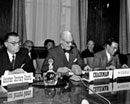 |
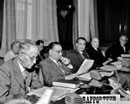 |
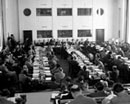 |
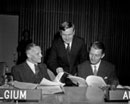 |
16 May 1951
International Law Commission, Opening meeting of the Third Session, Palais des Nations, Geneva, Switzerland
[Read more] |
16 May 1951
International Law Commission, Opening meeting of the Third Session, Palais des Nations, Geneva, Switzerland
[Read more] |
16 May 1951
International Law Commission, Opening meeting of the Third Session, Palais des Nations, Geneva, Switzerland.
[Read more] |
4 November 1957
Twelfth Session of the General Assembly, meeting of the Sixth Committee,
United Nations Headquarters,
New York
[Read more]
|
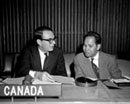 |
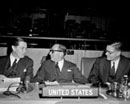 |
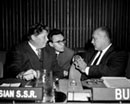 |
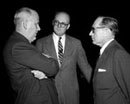 |
4 November 1957
Twelfth Session of the General Assembly, meeting of the Sixth Committee,
United Nations Headquarters,
New York
[Read more]
|
4 November 1957
Twelfth Session of the General Assembly, meeting of the Sixth Committee,
United Nations Headquarters,
New York
[Read more] |
4 November 1957
Twelfth Session of General Assembly, meeting of the Sixth Committee,
United Nations Headquarters,
New York
[Read more] |
4 November 1957
Twelfth Session of the General Assembly, meeting of the Sixth Committee,
United Nations Headquarters,
New York
[Read more] |
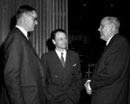 |
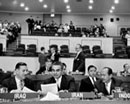 |
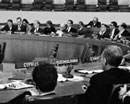 |
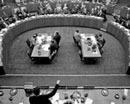 |
4 November 1957
Twelfth Session of the General Assembly, meeting of the Sixth Committee,
United Nations Headquarters,
New York
[Read more]
|
18 November 1957
Twelfth Session of the General Assembly, meeting of the Sixth Committee,
United Nations Headquarters,
New York
[Read more] |
2 April 1962
United Nations Committee on Defining Aggression,
United Nations Headquarters,
New York
[Read more] |
5 April 1965
Committee on the Question of Defining Aggression,
United Nations Headquarters,
New York
[Read more] |
 |
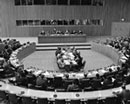 |
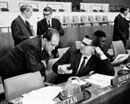 |
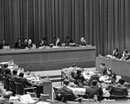 |
5 April 1965
Committee on the Question of Defining Aggression,
United Nations Headquarters,
New York
[Read more] |
3 April 1967
Committee on the Question of Defining Aggression,
United Nations Headquarters,
New York
[Read more] |
21 November 1968
Twenty-third Session of the General Assembly, meeting of the Sixth Committee,
United Nations Headquarters,
New York
[Read more]
|
26 November 1968
Twenty-third Session of the General Assembly, meeting of the Sixth Committee
[Read more] |
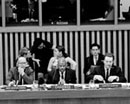 |
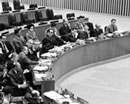 |
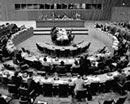 |
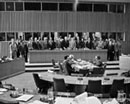 |
24 February 1969
Second Session of the Committee on the Question of Defining Aggression,
United Nations Headquarters,
New York
[Read more] |
24 February 1969
Second Session of the Committee on Question of Defining Aggression,
United Nations Headquarters,
New York.
[Read more] |
12 April 1974
Second Session of the Committee on the Question of Defining Aggression,
United Nations Headquarters,
New York.
[Read more] |
12 April 1974
Second Session of the Committee on the Question of Defining Aggression,
United Nations Headquarters,
New York
[Read more] |
|























